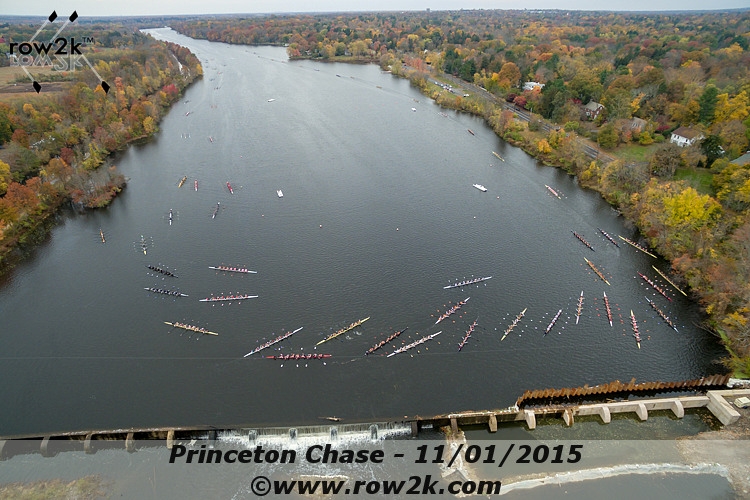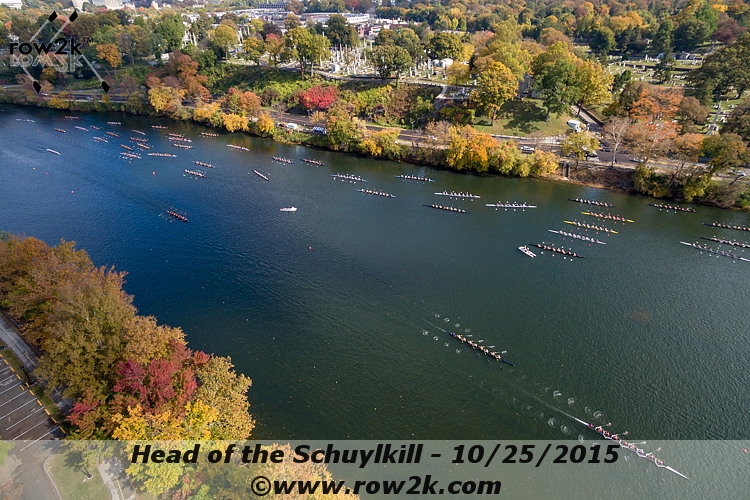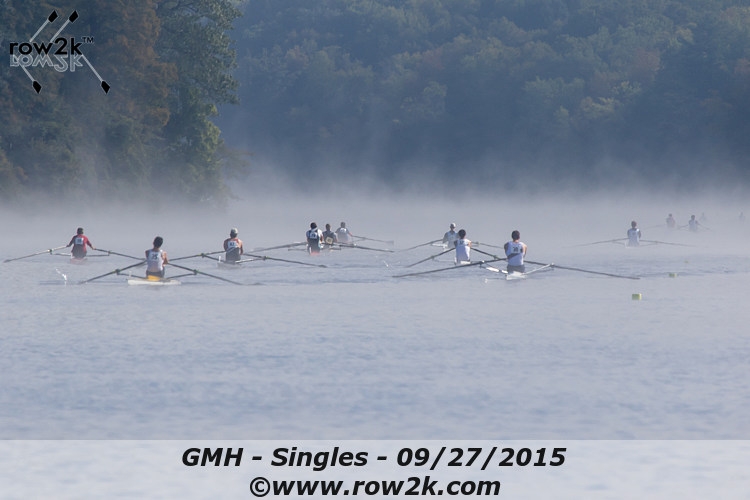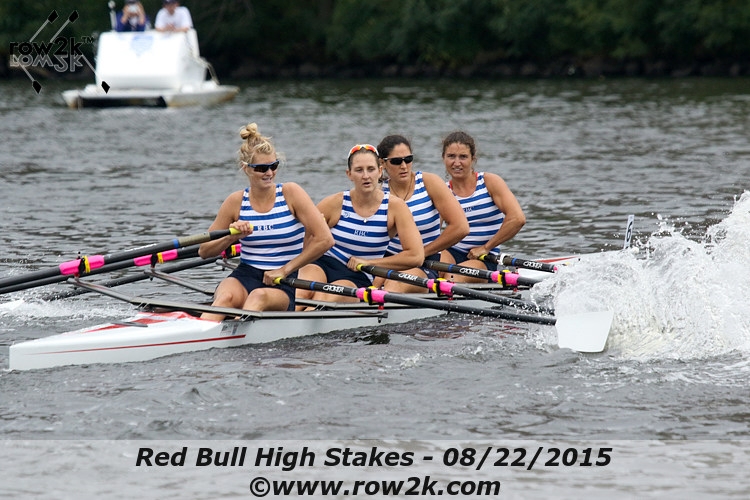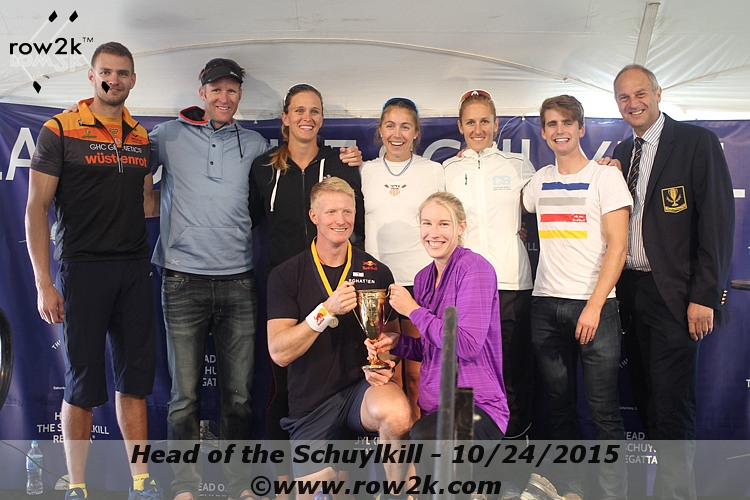
The supporters, organizers, and athletes on the banks of the Schuylkill Saturday afternoon mingled with smiles on their faces. Many of them have recalled fall regattas in drenched clothing, huddled under wind-swept tents in mud, straw and whatever Philly's plentiful geese left behind. On Saturday, although an occasional head wind blew up the course, the sun and pleasant race temps made even the gruffest Philadelphian a little more pleasant. I got a smile and a warning from a Philly police officer-does anyone know how unusual that is?
Saturday's highlight--not to eclipse the tremendous quantity and quality of the racing in the collegiate and club ranks--was certainly the Gold Cup Challenge for elite single scullers.
"I am not sure it was a technically sound row," Gold Cup women's winner Kim Crow of Australia said after getting her bow ahead in the 750 meter Gold Cup Challenge race. "I think I am very competitive," she replied when asked about how she approached the race, "I like to win races," she concluded. It really wasn't a matter of distance for her, it was a matter of bow across the finish line. "We are in the middle of our distance season at home, so it was a little bit of a shock to the system," she summarized. "We really don't get to race much over the year, so it is just great to get the opportunity."
"I think one of the nicest things about it is that we [Gold Cup competitors who trained in Princeton] get to spend the week together...we get to share stories about where you train, things we enjoy, sort of soul mates who understand what you do," said the Aussie sculler. "We have been looked after very well here, staying in a nice hotel, enjoying some great local food."
Crow, who travels almost a full day to get to events in the states (like Mahe Drysdale, NZ), says she handles the travel well. "I am lucky," she smiles, "I have a special talent at sleeping."

Finishing second was up-and-comer Carling Zeeman from Canada, who needed maybe 10 more strokes and might have overtaken the world champion Crow. Zeeman, who has come into single fairly recently, was definitely a force to be reckoned with at this shorter distance, but says she also feels that the 2k has the best appeal for her. Zeeman takes her training seriously, and is in a successful Canadian program, but plans to stay in that single.
A random boater, not affiliated with the regatta, waked the 700 meters for the women's race. USA W1x Gevvie Stone of the Cambridge Boat Club struggled with the wash on the short course-hard to recover from that in a two-and-a-half-minute race, and finished third. Previous winner Mirka Knapkova (Czech Republic) just didn't look like her fierce self and finished fourth.
The men's Gold Cup featured a software developer and a soldier. Andrew Campbell, current software developer and approximately 160 pounds has been beating the big guys for years, including his victory at the Head of the Charles in 2014 by a solid 10 seconds over today's winner, Kjetil Borch.
Czech sculler-and-soldier Ondrej Synek returned to Prague Saturday evening on a red eye after the racing, headed to an undisclosed forest 300km south of the capital to take part in combat drills for the Czech military force.
He says he was told to expect the unexpected, and that one of the soldiers was going to be forcefully taken "hostage" overnight. The question is this: what soldier in their right mind would pick a 6'8" 230-pound athlete as their captive?

On to the racing. The water was better for the men's Gold Cup than it had been for the women's race just 15 minutes earlier, but the headwind kicked in. Said Andrew Campbell who doesn't exactly have the heft to lean into the wind, "I turned the corner and was hit with the wind and shook my head."
From the shore, it looked very much Kjetil Borch's race, as the Norwegian finished with clear water ahead of Drysdale, with Synek in third. Campbell held his own, but weighing almost 80 pounds less than some of the guys here today definitely has disadvantages in a sprint.
No one ever wants to say it looked easy, but he made it look easy. Borch won this last year, seemed to thoroughly be enjoying himself, and celebrated enthusiastically. "I am more explosive than the traditional rower, and I try to use that in the 2k races too, but I like the shorter races because it allows me to fire up the power," said Borch.
"When I was younger, like in under 23s, I used to go out-fly and die-but I learned to control it," says Borch. The Norwegian sculler goes back to the bitter cold winter to train higher volume, lower intensity, until the bodies of water freeze. The National team will then head south to Italy, Portugal and other warmer European countries so they can keep on top of training into an Olympic year. Says Borch of the week with his Gold Cup training group, "the rowing family is a genuine family...you don't see it in other sports. After the race we are all friends."

For anyone who thought they elites in the Gold Cup who rowed a mere 700 meters got off easy, just take a look at the faces of pain from the photo gallery. The onset on blood lactate accumulation is not too comfortable--sprints may be short, but with several thousand dollars at stake and the close scrutiny of sponsors on the shore, those meters hurt something fierce.
The Gold Cup Foundation, and the Board of the Gold Cup, and athletes enjoyed the day with honorary Chair Sir Steven Redgrave. Redgrave, who was instrumental in the genesis of the current distance and concept for the Challenge, became an advisor when the Gold Cup Committee brought the trophy to the Henley Museum during the annual regatta. The Henley Royal Regatta Chairman, 5-time Olympic gold medal winner and 9-time World Champion is a legend in the sport, and he saw the opportunity to make it more of a spectator event-which short of the Henley itself, rarely has such close contact to the athletes.
"The best part of being 'honorary'," says Redgrave, "is that I am allowed to offer opinions." Which he did. The Gold Cup's first race in the current decade occurred during the Dad Vail regatta and was 2k distance. Redgrave thought the shorter distance would provide more excitement and also was a request of the athletes.
"When we spoke to the athletes," said Scot Fisher of the Board of the Gold Cup Foundation. "They had two requests: one was the have it in the fall, one was to make it a sprint." Fellow Board Member Bill McNabb shared the same details, and added, "The World Cups are in the spring when the Dad Vails were, it was hard to get athletes out here then. They loved the experience but it wasn't always going to work out for their schedules all the time."
He added that when they brought the Gold Cup to the Henley Museum, and spoke to Sir Steve, that the British rowing 'royalty' asked, "have you considered making it a sprint race?" McNabb said that "the purists among us thought we had to stay with the 2k, but the more we thought about it..." The rest was history. They dialed up some of the athletes and they were really excited about it. "I give Redgrave a lot of credit, he was the one who really got us thinking."
If you are unfamiliar with the mysterious past of the precious metal vessel, you can read up here. The Gold Cup contest and cup returned to the Schuylkill after an absence of more than 35 years and it has, with some logistical challenges in its first go-round, become a fixture at the Head of the Schuylkill Regatta.
The Head of the Schuylkill has embraced the Gold Cup event, and it has added a different element to the weekend for sure.

In addition to the Gold Cup, Saturday's racing at the Head of the Schuylkill was collegiate, club, corporate, elite, and masters. (For results, click here, and for photos, click here).
The fortification of host tents downriver for the Corporate Challenge and the Gold Cup event centered a lot of attention and energy on both adult novices and veteran elites-demographics not always a focus of this head race. Bill McNabb, who is probably better known as the CEO of the Vanguard Group, was also a rower at Dartmouth a few years back, has also made this day a huge corporate challenge event. Many local corporate teams from his own Vanguard, to Comcast and Aberdeen and beyond lined up on the sprint course mid-day while the collegiate rowers lined up at the chuck wagons and tents for vittles.
The tent city-that by the way smelled like gourmet food--rivaled that of HOCR the previous week. And HOCR master of ceremonies Fred Schoch was there to settle down from the previous week in Boston and just enjoy the sights and fine weather in Philadelphia.
The City of Brotherly love's rowing community unites for this one. Many of the masters who race on both days fill their spare hours as bouncers at the gate of Kelly Drive, information desk attendants, launch drivers, dock masters-you name it. The event is hosted by #7 Boathouse Row-University Barge Club-but most local clubs had representatives with fancy yellow Boathouse jackets on the course.
"I am surprised that there was already a line at the dock at 9:30 am," said race organizer Ellen Carver. The 2015 iteration of the HOSR had 1,910 boats over two days-the largest regatta on the Schuylkill. Because the calendar this year gives the rowing world an extra week for head racing in October, attendance was up.
Comments | Log in to comment |
There are no Comments yet
| |
If you enjoy and rely on row2k, we need your help to be able to keep doing all this. Though row2k sometimes looks like a big, outside-funded operation, it mainly runs on enthusiasm and grit. Help us keep it coming, thank you! Learn more.
- Bont Rowing
- Calm Waters Rowing
- Concept 2
- Craftsbury Sculling
- The Crew Classic
- CrewLAB
- Croker
- Dad Vail Regatta
- Durham Boat Co.
- Empacher
- Faster Masters
- Filippi
- Fluidesign
- h2row.net
- HUDSON
- myrow
- Nielsen-Kellerman
- Oak Ridge RA
- Peinert Boat Works
- Pocock Racing Shells
- Race1 USA
- Rockland Rowing Masters Regatta
- RowKraft
- Rubini Jewelers
- Vespoli USA
- WinTech Racing
- Bont Rowing
- Calm Waters Rowing
- Concept 2
- Craftsbury Sculling
- The Crew Classic
- CrewLAB
- Croker
- Dad Vail Regatta
- Durham Boat Co.
- Empacher
- Faster Masters
- Filippi
- Fluidesign
- h2row.net
- HUDSON
- myrow
- Nielsen-Kellerman
- Oak Ridge RA
- Peinert Boat Works
- Pocock Racing Shells
- Race1 USA
- Rockland Rowing Masters Regatta
- RowKraft
- Rubini Jewelers
- Vespoli USA
- WinTech Racing



